Science teachers take to the stage Inspire article
Science recognises no national borders – and neither does Science on Stage, the network for European science teachers. Eleanor Hayes attended the international festival.
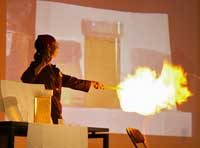
are an integral part of
Science on Stage
Image courtesy of Science on
Stage Europe
Both Science in School and the Science on Stage network for teachers were initiated by EIROforumw1, so as a representative of both EIROforum and Science in School, I was delighted to attend the Science on Stagew2 international teaching festival in April 2011. Where better to find teaching activities to share with you, our readers, than at a festival of 350 science teachers, selected from across Europe for their inspiring ideas?
The European aspect is one of the things that make Science on Stage so special. As Jörg Gutschank from Germany explained, “Meeting people from so many different countries, you see so much more than you would see at teachers’ meetings in your own country.” Helle Houkjaer from Denmark agreed. “I most enjoyed exchanging ideas with colleagues from other countries, and discussing how they teach the same subject as I do, but in another way.”
Appropriately enough, the festival was held at the Ørestad upper-secondary school in Copenhagen, Denmark. Opened in 2006, the school receives visitors from across the world, eager to learn about the school’s philosophy of teaching in open spaces – and to see the architecture that supports such teaching.
During the festival, which took place during school holidays, the fair occupied the open spaces on all five floors, with teachers from 22 European countries displaying and discussing 239 teaching projects, and swapping ideas and experience. With so many projects, there was inspiration for everyone to take home.
Christian Selchow from Germany looks forward to trying out what he learned from the Czech stand: Zdenek Polak’s students put an infra-red filter in front of a normal digital camera, and were able to visualise infra-red radiation and investigate how different materials react to itw3. “It’s inspiring because I’ve already got all the materials, and I can work together with my students on it – we’ll be in the same experimental phase,” Christian explains.
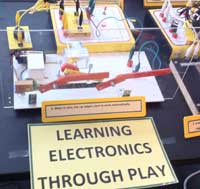
Cyprus challenges his
students to wire the circuits
correctly. Can they get the
car windscreen wipers to
start automatically when it
rains? Will the supermarket
conveyor belt stop when the
food passes the
photoelectric barrier?
Images courtesy of Eleanor
Hayes
Siri Krogh from Norway is in her first year of teaching. “I will be going home with so many simple ideas I can try out straightaway. For example Katerina Lipertova’s ‘Playful physics’ projectw3 from the Czech Republic, to build little moveable toys out of recycled materials – it was simple and not expensive.”
There were also more than 30 workshops and masterclasses by teachers and other experts in science educationw3. Paul Nugent, one of the organisers of Science on Stage Ireland, explained: “The masterclasses were outstanding – really useful, practical teaching ideas that could be used straightaway. I particularly liked the Spanish masterclass entitled ‘Listening to gravity’.”
Catherine Tattersall from Ireland, whose innovative project with aqua beads won a prize (see box), was fascinated by the European Space Agency’s (ESA) workshopw3 on developing experiments to run on the International Space Station. She and Shamim Hartevelt (ESA) plan to investigate whether these beads can be used to test how plants grow under conditions of microgravity. “I would be the coolest teacher on Earth if I could get a science project into space,” she enthused.
The participants in Angela Köhler’s masterclass about ‘Chocolate science’w3 learned a lot, but so did she. “Later, people asked me about the project and we discussed the situation in their countries and how the project could be used there.”
There’s no doubt that for the 350 participants, this all-expenses-paid festival was an inspiring experience that will enrich their teaching. But that is only the tip of the iceberg: each of these teachers was selected from among the most inspiring teachers in their own countries and all of them will be taking ideas back home to share with their colleagues.
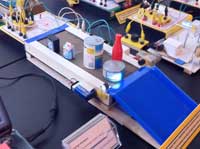
Helle Houkjaer already has plans: “We have a network in our community with one or two teachers from each school, so at our next meeting, I can tell them about what I have learned here.”
When I spoke to the Irish team, they were also planning to share some of the ideas from the festival – not only with their Irish colleagues but also with all enthusiastic teachers. As they have done after each Physics on Stage and Science on Stage festival, they will prepare a downloadable book of demonstrations and teaching ideas, including pictures and instructions, as well as videos of 50 of the experimentsw4. The team are also planning workshops to share the ideas with Irish teachers in a more hands-on way.
Think Ing, an initiative of the German Association of the Metal and Electrical Industry Employers (Gesamtmetall), aims to improve science teaching in Germany – and it supports not only the German event but also Science on Stage Europe. As Wolfgang Gollub from Think Ing explains, “To improve science teaching in Germany, you need to look around Europe, look over the fences and try to gather the best ideas for improving science teaching.” With Thing Ing’s support, the German team will also be publishing some of their favourite experiments and projectsw5.
Following a model established by Science on Stage Germany (see Hayes, 2010), Antonio Gandalfi from Italy also hopes to maintain some of the momentum of the international festival by inviting Science on Stage teachers from other countries to run a masterclass for Italian teachers.
And of course, in forthcoming issues of Science in School, we hope to share several of the activities from the Science on Stage international festival with you.
Momentum is an important element of Science on Stage. In 2013, the next international festival will be a cross-border event, hosted by the adjoining towns of Frankfurt an der Oder (Germany) and Słubice (Poland). In the run-up to that festival, there will be dozens of national festivals, competitions, workshops and other events in many countries to select the participants. If you would like to join the Science on Stage network, exchanging ideas and inspiration with colleagues from across Europe, contact your national organiser through the Science on Stage Europe websitew2. You may even get to represent your country in 2013!
The winning projects
All the participants at the Science on Stage international festival were winners: they had been selected from among thousands of teachers across Europe for their innovative ideas. But there were further prizes for some lucky participants.
EIROforum, as the initiator of Science on Stage, was happy to continue its support in the form of three prizes: reserved all-expenses-paid places in the EIROforum teacher schoolw6 in October 2011, in a CERN teacher schoolw7 and in an EMBL ELLS teacher workshopw8. Furthermore, Intel Corporation sponsored five generous prizes: one of US$2000 and four of US$1000 each.
As co-chairs of the award committee, Helle Houkjaer and I agreed on five criteria for a winning project:
- Is it innovative?
- Is it useable and relevant for science teaching?
- Is it educational?
- Is it easy for other teachers to repeat?
- Does it make good use of minimal resources?
Not all our winners had to meet all the criteria and, as always, it was very difficult to select eight from among so many outstanding projects. After much discussion, Helle, Jörg Gutschank (Germany), Fernand Wagner (Luxembourg), Michalis Hadjimarcou (Cyprus), Alison Alexander (UK), Anders Blomqvist (Sweden), Ulrich Johan Kudahl (Denmark) and I agreed on the eight winning projects.
Intel prize (US$2000): Michael Vollmer and Kalus-Peter Möllmann from Germany, for their ‘High speed / low speed’ project to understand the physics of phenomena as varied as breaking spaghetti and exploding balloons with the aid of inexpensive high-speed cameras.
Intel prize (US$1000): Catherine Tattersall from Ireland, for her ‘Colourful science – introducing aqua beads’ project, in which she grew algae on hydroponic gel beads for photosynthesis experiments, soaked the beads in universal indicator solution for pH tests and developed many other innovative uses for the beads. She even hopes to send an experiment into space, with help from the European Space Agency (see above).
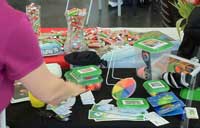
that fit into a rucksack and
can be taken along the
Austrian Lichtenberg primary
school’s planetary trail to
demonstrate the science on
the planets – and much more
Image courtesy of Eleanor
Hayes
Intel prize (US$1000): Imma Abad and Pere Compte from Spain for their ‘Thermoelectric solar energy’ project, in which the students investigated the technologies involved in generating solar energy, then designed, developed and built several prototypes and experiments to explain how we can exploit solar energy without using photovoltaic cells.
Intel prize (US$1000): Ida Regl from Austria for ‘Cosmi wants to know’, a development of her ‘Sunny side up project’ which won an award at Science on Stage 2 in 2007. Since then, the project has expanded to cover all four years of primary education and – together with pupils, parents, the local council and scientists from the university – the school has built a planetary walk. Visitors can even borrow a rucksack filled with small experiments to help them on their trip through the Solar System. More information and instructions for carrying out the experiments are available on the project websitew9.
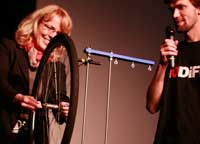
director of the German
Association of the Metal and
Electrical Industry Employers
(Gesamtmetall), one of the
sponsors of the festival,
investigates audible light
on stage
Image courtesy of Science on
Stage Europe
Intel prize (US$1000): Olaf Gutschker from Germany, for his ‘Physics from the inside out’ project, which shows how magnetic resonance imaging works, with the aid of some simple equipment.
Jan Pavelka and Ondrej Pribyla from the Czech Republic received the EIROforum prize for their project ‘See the sound, hear the light’, which uses light to help us understand basic acoustic concepts in a dramatic and appealing way.

project involves studying
chemistry with Pliny the
Elder. You too can smell
like Julius Caesar!
Image courtesy of Eleanor
Hayes
For his ‘From rainbows to the chemistry of colours’ project, which uses simple home-made apparatus to demonstrate why a rainbow has its characteristic curved form, Elias Kalogirou from Greece received the CERN prize.
In this, the International Year of Chemistry, chemistry teacher Gianluca Farusi from Italy was delighted to win the ELLS prize for his extensive and interdisciplinary project ‘Studying chemistry with Pliny the Elder’, one of the activities of which was the creation by his students of telinum, the perfume used by Julius Caesar.
To learn more about these and all other projects, workshops and masterclasses, see the abstracts in the festival programmew3.
My EIROforum, CERN and EMBL colleagues look forward to welcoming the prize-winners at their teacher workshops, where they will have the chance to develop their ideas together with research scientists and other exceptional science teachers. Congratulations to the prize-winners, but also to all 350 participants at the Science on Stage international festival. I hope to see some of you, our readers, at the next festival.
References
- Hayes E (2010) Science on Stage: sharing teaching ideas across Europe. Science in School 16: 2-5.
Web References
- w1 – EIROforum is a partnership of eight of Europe’s largest inter-governmental research organisations, and is also the publisher of Science in School. See: www.eiroforum.org
- w2 – To learn more about Science on Stage Europe, see: www.scienceonstage.eu
- To find your national contact, click on ‘National activities’, then ‘Science on Stage countries’.
- w3 – The abstracts of all projects, workshops and masterclasses at the festival are available in the festival programme, which can be downloaded here: www.scienceonstage.eu/?p=3_2
- w4 – To download free books of demonstrations and teaching ideas, chosen by the Irish team at all the previous Science on Stage and Physics on Stage festivals, visit www.scienceonstage.ie
- w5 – A publication with the German team’s favourite experiments and projects will be freely available for download from the Science on Stage Germany website: www.scienceonstage.de
- w6 – From 9-12 October 2011, EIROforum, the publisher of Science in School, will be offering a free, three-day course entitled ‘Physics and chemistry of life’ to European science teachers. To learn more, see: http://tinyurl.com/eiroschool
- To read about the first EIROforum teacher school, see:
- Hayes (2010) Teachers and scientists face to face: the first EIROforum teacher school. Science in School 14: 6-9.
- w7 – CERN, the world’s largest particle physics laboratory and a member of EIROforum, offers courses for physics teachers in English or in their mother tongue, lasting between 3 days and 3 weeks. To learn more, see: http://education.web.cern.ch/education/Welcome.html
and
CERN (2009) Particle physics close up: CERN high-school teachers programme. Science in School 13: 4-5. - w8 – Based at the European Molecular Biology Laboratory (EMBL, a member of EIROforum), ELLS is a science education facility that brings secondary-school teachers in contact with EMBL’s scientific environment, fostering mutual exchange between European high-school teachers and research scientists. For more details, see: www.embl.org/ells
- w9 – To learn more about ‘Cosmi wants to know’ and download instructions for the planetary experiments, see: www.cosmi.at
Institutions
 Science on Stage
Science on Stage





